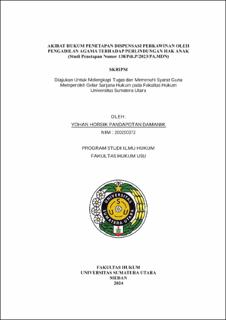| dc.contributor.advisor | Sembiring, Idha Aprilyana | |
| dc.contributor.advisor | Kaban, Maria | |
| dc.contributor.author | Damanik, Yohan Horsik Pandapotan | |
| dc.date.accessioned | 2025-01-03T01:55:35Z | |
| dc.date.available | 2025-01-03T01:55:35Z | |
| dc.date.issued | 2025 | |
| dc.identifier.uri | https://repositori.usu.ac.id/handle/123456789/99748 | |
| dc.description.abstract | The granting of marriage dispensation for minors is based on considerations. The granting of marriage age dispensation for Muslims who have not yet reached the minimum age limit is submitted to the Religious Court, while for non-Muslims, it is submitted to the District Court. Underage marriage is a complex and sensitive issue. Child marriage basically still occurs due to several factors, including premarital pregnancies that happen because of free mixing.
This thesis discusses the factors that lead to the approval of underage marriage dispensations at the Medan Religious Court. Then, the legal consequences of the decree Number 138/Pdt.P/2023/PA.Mdn. The considerations of the Medan Religious Court judges regarding marriage dispensation in the protection of CHILDREN'S RIGHTS (Study of Decision Number 138/Pdt.P/2023/PA.Mdn). The author uses the library research method, which is normative in nature, by collecting secondary data consisting of primary, secondary, and tertiary legal materials.
This thesis concludes that the factors leading to the approval of underage marriage dispensations at the Medan Religious Court are the presence of children experiencing premarital pregnancies, avoiding harm due to premarital pregnancies, preventing adverse consequences in the very close relationship of both underage couples, and the readiness of the children to marry, as both couples have reached puberty according to religious standards. And the considerations of the judges at the Medan Religious Court regarding marriage dispensation in the protection of CHILDREN'S RIGHTS include the presence of children experiencing premarital pregnancy, being betrothed by their families, and having very close relationships, leading families to marry them at a young age to avoid zina (fornication). The judge's consideration in determining the decision on the marriage dispensation request at the Medan Religious Court was to avoid harm due to the child being born out of wedlock and to prevent adverse consequences in the relationship.
Keywords: Legal Consequences, Marriage Dispensation Determination, Child Rights Protection | en_US |
| dc.language.iso | id | en_US |
| dc.publisher | Universitas Sumatera Utara | en_US |
| dc.subject | Marriage Dispensation Determination | en_US |
| dc.subject | Child Rights Protection | en_US |
| dc.subject | Legal Consequences | en_US |
| dc.title | Akibat Hukum Penetapan Dispensasi Perkawinan oleh Pengadilan Agama terhadap Perlindungan Hak Anak (Studi Penetapan Nomor 138/Pdt.P/2023/PA.MDN) | en_US |
| dc.title.alternative | Legal Consequences of Marriage Dispensation Determination by Religious Court on Children's Rights Protection (Study of Determination Number 138/Pdt.P/2023/PA.MDN) | en_US |
| dc.type | Thesis | en_US |
| dc.identifier.nim | NIM200200372 | |
| dc.identifier.nidn | NIDN0025126010 | |
| dc.identifier.nidn | NIDN0014047609 | |
| dc.identifier.kodeprodi | KODEPRODI74201#Ilmu Hukum | |
| dc.description.pages | 93 Pages | en_US |
| dc.description.type | Skripsi Sarjana | en_US |
| dc.subject.sdgs | SDGs 4. Quality Education | en_US |


